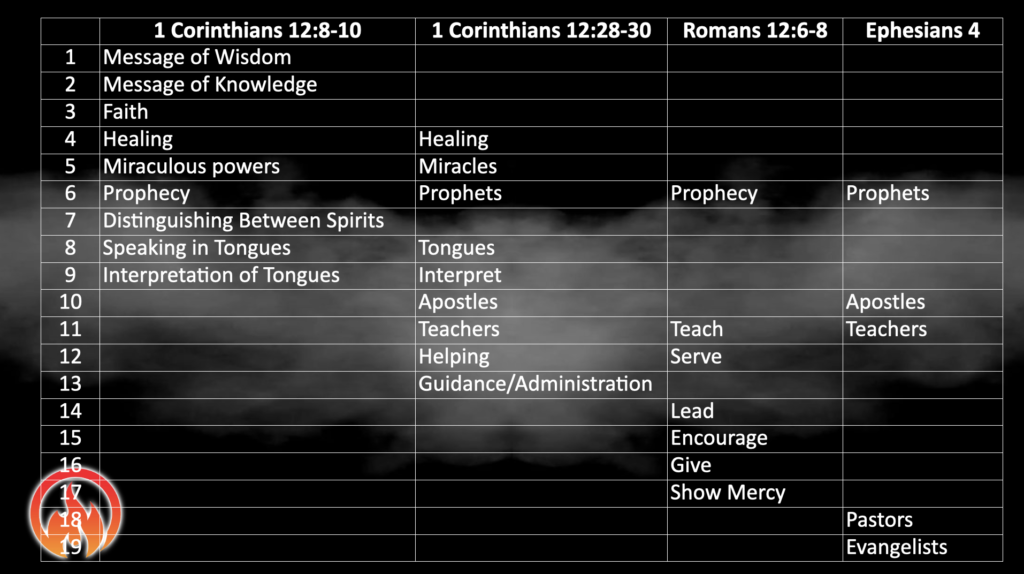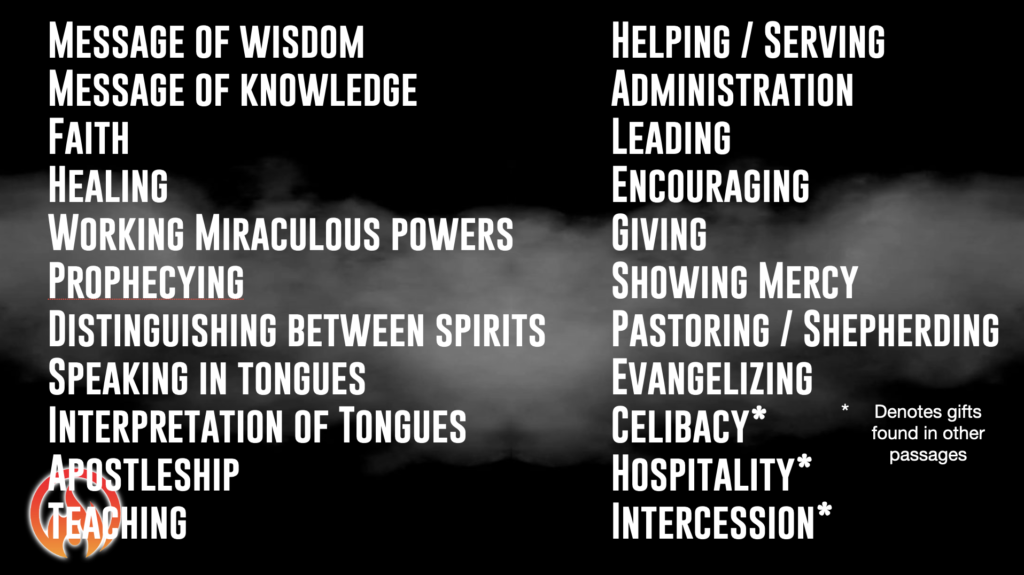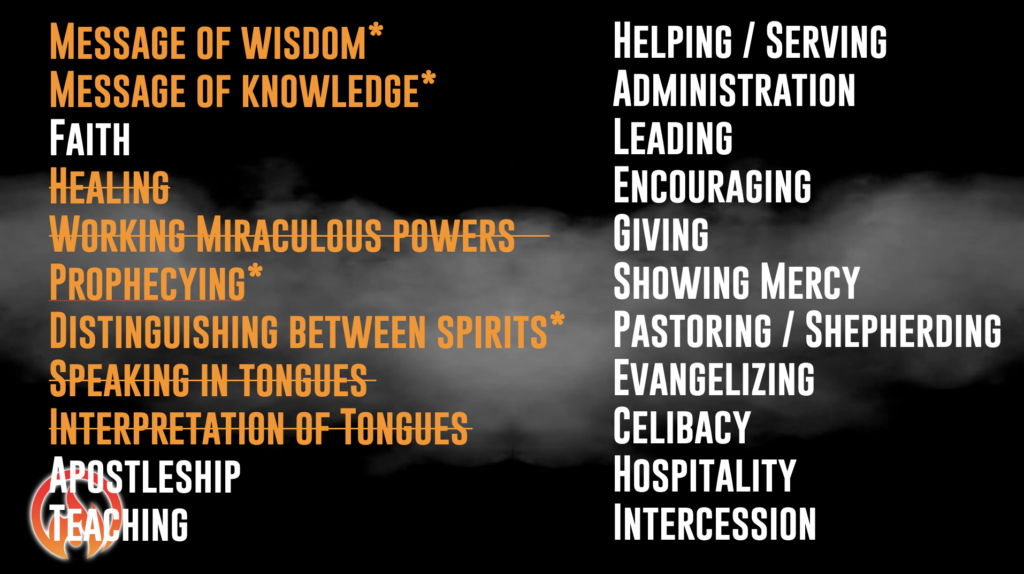In 4 different places the Bible tells us that the Holy Spirit gives believers special gifts as He determines. In this message we look at those spiritual gifts and why different groups of Christians work off of different lists. But regardless of where you stand on the supernatural gifts, the Spirit has placed a gift in you and wants you to use it for God’s glory.
* To view all the slides from the message, including the list of all the gifts as they appear in the 4 primary passages, click the “Save” button above and download the document.
The Message
Today we continue our sermon series “Fresh Fire,” in which we are learning about the Holy Spirit. Let’s recap what we’ve discussed so far.
Week 1 – The Holy Spirit is God. In Old Testament times this Spirit of God came upon humans temporarily whenever His power was needed. In New Testament times, and our time, the Holy Spirit dwells permanently in every Christian, including you and me.
Week 2 – What does the Holy Spirit do? First, He marks us as God’s from the moment of salvation. He is a seal on our hearts to identify us as belonging to God. He is a guarantee that we will inherit everything God promised. Once the Holy Spirit is placed in our hearts by God’s good grace, He will not be removed because of our bad behavior.
Week 3 – After entering our hearts and marking us, the Holy Spirit guides us in how to live, steers us away from sin, and helps us identify what decisions to make and what truth to believe. Like a mother trying to help us on our way, the Holy Spirit guides and directs us every day.
Today we will look at the Holy Spirit as the good gift giver.
Before we get started, have you ever taken a spiritual gifts assessment? If you did, did you find it helpful? Was it confusing? Did it make any difference?
My goal today is to help us all reach a common understanding of what these gifts of the Spirit which are described in the Bible are and why the Holy Spirit gives them to us. I want to point you toward identifying and using your gifts for God’s glory.
To be honest, I struggled with this message because there is so much confusion and disagreement about the topic. The following is an example of what makes identifying your spiritual gift confusing:
- The assessment on the Focus on the Family website identifies 7 spiritual gifts.
- The assessment from Lifeway (Southern Baptist Publishing) lists 16 possible gifts. I was interested to see that half the gifts listed in 1 Corinthians 12:8-10 are options, but not the more miraculous ones.
- Another assessment, this one from a mega-church, included several Old Testament skills as spiritual gifts: woodworking, singing, playing instruments, artistry, and writing.
With this variety of information available, how can Christians identify their spiritual gifts and use them for God’s glory? When I shared this information with my wife, she asked, “Why is there so much confusion? Aren’t all the gifts listed in the Bible?” Well, yes, they are; but many Christians believe some gifts are no longer valid after the death of the last Apostle. Others have added natural skills listed in the Old Testament and consider them spiritual gifts.
I want to show you how a spiritual gift is more than a natural aptitude or developed skill. It is something that shows up in your life AFTER you become a Christian because the Spirit of God himself has given you this good gift.
With that said, I hope today to bring some clarity and agreement about what spiritual gifts are. Our goal is to move forward as a church that uses the gifts from the Spirit of God to make an impact in our community.
Basics about the Spiritual Gifts
First of all, I want us to look at the basics that are taught regarding spiritual gifts. Since the main text on these is found in 1 Corinthians 12, we will walk through the chapter and draw some conclusions.
1 Corinthians 12:1, 4 – Now about the gifts of the Spirit, brothers and sisters, I do not want you to be uninformed… There are different kinds of gifts, but the same Spirit distributes them.
All gifts are GIVEN by the Holy Spirit. He is the source. He gives; we receive. Spiritual gifts are not something we earn or attain. This is why I said a spiritual gift is more than a natural aptitude or achievement. An aptitude may be evident very early in a person’s life, but a spiritual gift is bestowed at the precise moment of salvation.
1 Corinthians 12:7 – Now to each one the manifestation of the Spirit is given for the common good.
Every believer receives a gift. No one is skipped over; you can’t say you didn’t receive one. If you think you don’t have a gift, you just haven’t identified it yet. Even though some people think you have to “work up to” using your gift, this isn’t so. The brand-new Christian is just as gifted and capable of using that gift as one who has been a Christian for many years.
Notice that 1 Corinthians 12:7 says spiritual gifts are given “for the common good,” meaning they are to be used to benefit the church. Other verses say the gifts are “for the benefit of the body.” The gifts are not for our own pleasure; there is to be no pride, no showing off, no personal gain.
As an example, in Acts, spiritual gifts are demonstrated all through the book to build up the church and extend the gospel. Simon the sorcerer offers money for the spiritual gifts he observes, and he is rebuked by Peter. God’s gifts are not for sale! They come from the Holy Spirit to all true believers for the benefit of the church.
1 Corinthians 12:11 – All these are the work of one and the same Spirit, and He distributes them to each one, just as He determines.
The Spirit determines the gifts. We don’t get to choose. God knows the perfect gift for you in light of the future He knows you will have. Our expectations play no role in which gift we receive; so don’t bother sitting around wishing you had a different gift.
1 Corinthians 12:24-25 – But God has put the body together, giving greater honor to the parts that lacked it, so that there should be no division in the body, but that its parts should have equal concern for each other.
All gifts are of equal value to God. Some people look up to those with the “cool gifts” as being the most important members in the church. However, there is no hierarchy of importance among Christians. In the human body, some parts may seem more valuable than others; but if you remove the liver, for instance, the body will cease to function properly.
1 Corinthians 12:29-30 – Are all Apostles? Are all prophets? Are all teachers? Do all work miracles: Do all have gifts of healing? Do all speak in tongues? Do all interpret?
These are rhetorical questions, and the answer to each of them is “No.” No single spiritual gift is meant for everyone.
What are the Gifts of the Spirit
Now that we have established some basics MOST Christians agree on about the spiritual gifts, we can look at the actual gifts themselves.
The gifts of the Spirit are found primarily in four passages:
1 Corinthians 12:8-10 and 28-30; and Romans 12:6-8; and Ephesians 4:7-13.

When you combine these lists you come up with 18 to 20 gifts depending on how you read the verses and whether you include any additional spiritual gifts alluded to in other Bible verses.

Some of these gifts seem supernatural – and they are because they are given by the Spirit of God. Some people don’t feel comfortable with these gifts, though; and because they haven’t seen the gifts in action, they feel the gifts must not be for the church any longer. These Christians, called Cessationists, hold beliefs completely opposite to those of the Pentecostals. Pentecostals believe everyone should speak in tongues; Cessationists believe the supernatural gifts of the spirit ceased with the death of the last Apostle. That’s how they explain all the supernatural gifts demonstrated in the book of Acts but not seen in their American churches anymore. They come to that conclusion from:
1 Corinthians 13:8-10 – But where there are prophecies, they will cease; where there are tongues, they will be stilled; where there is knowledge, it will pass away. For we know in part and we prophesy in part, but when completeness comes, what is in part disappears.
Cessationists believe the completeness arrived when the canon of scripture, our Holy Bible, was finished being written. I disagree with the cessationist view that the “completeness” has already come and believe the completeness Paul is talking about is when Jesus returns to this world and all of his followers join him in the new heaven and new earth.
The concept of spiritual gifts available to us today differs for those with Cessation beliefs. Look at the gifts described by Lifeway (Cessation SBC). Not only do some gifts cease completely, but others on the list lose all supernatural meaning.

While I have pointed out the views between a Pentecostal, a Cessationist, and a Charismatic like myself (somebody who believes all the gifts still function today, but not everybody speaks in tongues), don’t miss that we all still agree on many aspects of the spiritual gifts.
Use your gifts to glorify God!
We have looked at some basic teaching on spiritual gifts and what the gifts actually are; but here is where the rubber meets the road! If you are a follower of Jesus, if you have the Spirit of God inside you, sealing you and guiding you, then you have received a gift from Him! What are you going to do with that gift?
1 Peter 4:10 – Each of you should use whatever gift you have received to serve others, as faithful stewards of God’s grace in its various forms. If anyone serves, they should do so with the strength God provides, so that in all things God may be praised through Jesus Christ. To Him be the glory and the power forever and ever. Amen.
We should not ignore this teaching! The end of this verse shows us why we can’t avoid identifying and using our gifts. You were given the gift “so that in all things God may be praised” and “to Him be the glory and power.” We are to use these gifts to glorify God.
For many of you, this line of thought may be very new, and you may not have any idea where and how to start using your gift.
- Identify your spiritual gift. Figure out what your gift is. Pray for understanding and openness so you can be made aware of the gift the Holy Spirit has already placed inside you. Remember you don’t ask for the gift; you already have it. You ask to be made aware of it. Go online and take the gift assessment I shared on Facebook. Buy a book about spiritual gifts and try to determine what seems to fit with your interests and experiences.
- Thank God for what He has given you. Before you begin to use your gift, take time to thank Him for giving you the abilities you have. God chose specific skills for you to share with the world so that glory goes back to Him as Creator.
- Ask God how you can use the gift. It’sall right to feel unsure and insecure. Ask God for courage to begin to use the gift. Ask Him to make it clear when to operate with the gift. Remember, the spiritual gift is given by the same Spirit who is your guide. He will help you see opportunities to use your gift to strengthen the Body of Christ.
- Practice by starting small. Especially if you have a more supernatural gift, you may not want to begin working miracles by coming to a church potluck with crumbs in your pocket, expecting to turn it into a loaf of artisan bread. But if you feel like you have the gift of knowledge and you feel something about somebody, humbly ask them if you might try sharing something you THINK God has shared with you. Let them know you are fallible but trying to be faithful. Then share. The more “WOW! That was God!” moments you slowly step into, the more comfortable you will be to continue following the leading of the Spirit. And if your gift is something you can more easily choose to do in the church – things like teaching, administration, encouragement – then please let your pastor know so he can find places for you to use your gifts.
- Learn more about your gift. What we’ve covered today is just a short overview, but this is an important part of our Christian experience. I encourage you to keep learning about your gift. Look it up online or buy a book. Talk to others about it. Get feedback about what they see in you. God didn’t give you this incredible gift to squander, but to develop and use.
Maybe some of you have been offended today by my speaking about the Pentecostals, while others may be offended that I’m not a Cessationist. But regardless of where you fall on this spectrum, we all believe spiritual gifts are for all believers today. We just don’t agree on which gifts. Everyone has a gift that should be used.
Can you imagine how our church might be different if we all courageously examined our lives, identified our spiritual gifts and then used them for God’s glory? I imagine our faith would grow, and I imagine word would spread that God was on the move at First Baptist. So let’s stop seeing this as optional. Let’s follow the Spirit as He leads us to step out in faith and use our gifts to the glory of God!
0 Comments